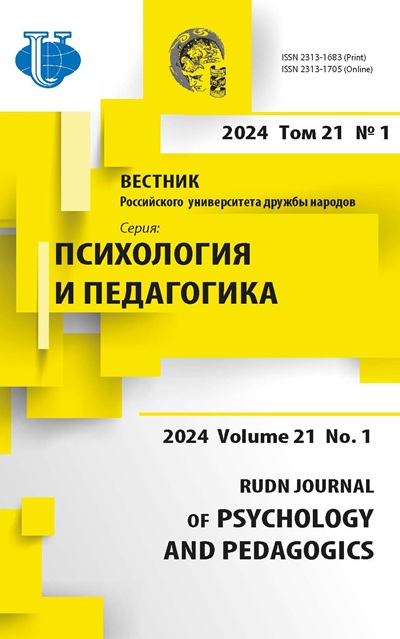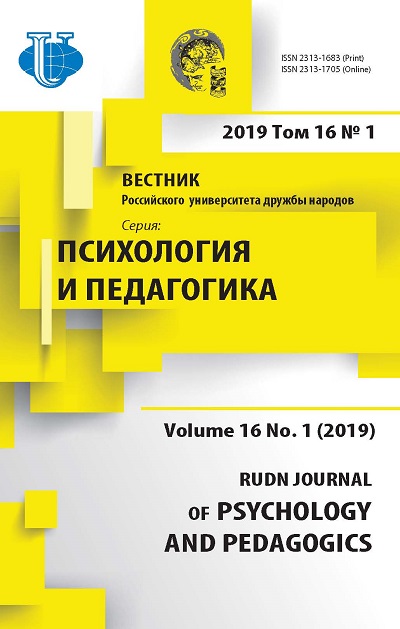Concept of Cognitive Reserve in Context of Studying Coronary Heart Disease: Modern Views and Prospects of Scientific Research
- Authors: Eremina D.A1, Sidorovskaya Y.M1
-
Affiliations:
- Saint Petersburg State University
- Issue: Vol 16, No 1 (2019)
- Pages: 20-38
- Section: CLINICAL PSYCHOLOGY AND PSYCHOPHYSIOLOGY
- URL: https://journals.rudn.ru/psychology-pedagogics/article/view/20825
- DOI: https://doi.org/10.22363/2313-1683-2019-16-1-20-38
Cite item
Full Text
Abstract
The article presents the results of a theoretical analysis of the contemporary foreign and domestic literature on the concept of the cognitive reserve, which is currently extremely urgent. The problems and the specificity of the cognitive impairments in patients with cardiovascular pathology, in particular, with coronary heart disease, as well as the main concepts and methodological problems of the concept of cognitive reserve are discussed in detail. The problem of the operationalization of this concept and the difficulties associated with it in determining the potential mechanisms of the cognitive reserve implementation are considered. The reciprocal influence of cognitive impairments on the course and prognosis of the coronary heart disease, in particular, on the level of compliance of the cardiac patients and subsequent psychological rehabilitation has been considered. In this regard, the paper discusses the potential directions for further research on the concept of cognitive reserve in relation to coronary heart disease, namely, the prospects of the study of the relationship between cognitive impairment and affective pathology and, in particular, alexithymia, which can significantly optimize the existing rehabilitation schemes for patients with ischemic heart disease.
About the authors
Daria A Eremina
Saint Petersburg State University
Author for correspondence.
Email: daria.a.eremina@gmail.com
Ph.D. in Psychology, Senior Lecturer of the Department of Medical Psychology and Psychophysiology, Saint Petersburg State University
7-9 Universitetskaya Emb., Saint Petersburg, 199034, Russian FederationYulia M Sidorovskaya
Saint Petersburg State University
Email: sidorovskaya_yulya@mail.ru
3nd year student of the Faculty of Psychology, specialty “Clinical psychology”, Saint Petersburg State University
7-9 Universitetskaya Emb., Saint Petersburg, 199034, Russian FederationReferences
- Ageenkova, E.K. (2016). Arbitrary prolongation of psychoemotional stress as a risk factor of cardiovascular diseases. Personality in a Changing World: Health, Adaptation, Development, (4), 98—102. (In Russ.)
- Bak, T.H., Nissan, J.J., Allerhand, M.M., & Deary, I.J. (2014). Does bilingualism influence cognitive aging. Annals of Neurology, (75), 959—63. doi: 10.1002/ana.24158
- Balashkevich, N.A., Kerimkulova, A.S., & Zhumambaeva, R.M. (2013). Psychosomatic aspects influencing the development of cardiovascular diseases. Science & Healthcare, (5), 42—44. (In Russ.)
- Barulli, D., & Stern, Y. (2013). Efficiency, capacity, compensation, maintenance, plasticity: emerging concepts in cognitive reserve. Trends in Cognitive Sciences, 17(10), 502—9. doi: 10.1016/j. tics.2013.08.012
- Canto, J.G., & Iskandrian A.E. (2003). Major risk factors for cardiovascular disease: debunking the “only 50 %” myth. Journal of the American Medical Association, (290), 947—949. doi: 10.1001/ jama.290.7.947
- Chalah, M.A., Kauv, P., Lefaucheur, J.P., Hodel, J., Créange, A., & Ayache, S.S. (2017). Theory of mind in multiple sclerosis: a neuropsychological and MRI study. Neuroscience Letters, (658), 108—113. doi: 10.1016/j.neulet.2017.08.055
- Chalah, M.A., & Ayache, S.S. (2017). Alexithymia in multiple sclerosis: a systematic review of literature. Neuropsychologia, (104), 31—47. doi: 10.1016/j.neuropsychologia.2017.07.034
- Dainikova, E.I., & Pizova, N.V. (2014). Cognitive reserve and cognitive impairment: medicinal and non-drug correction methods. Nevrologiya, neiropsikhiatriya, psikhosomatika, (2S), 62—68. (In Russ.)
- Dulau, C., Deloire, M., Diaz, H., Saubusse, A., Charre-Morin, J., Prouteau, A., & Brochet, B. (2017). Social cognition according to cognitive impairment in different clinical phenotypes of multiple sclerosis. Journal of Neurology, 264 (4), 740—8. doi: 10.1007/s00415-017-8417-z
- Efimova, N.Yu., Deloire, M., Diaz, H., Saubusse, A., Charre-Morin, J., Prouteau, A., & Brochet, B. (2009). Cognitive function and cerebral perfusion in patients with a constant form of atrial fibrillation. Neurological Journal, 14(5), 15—18. (In Russ.)
- Elwood, P.С. (2002). Vascular disease and cognitive function in older men in the Caerphilly cohort. Age Ageing, 31(1), 43—8. doi: 10.1093/ageing/31.1.43
- Eremina, D.A. (2015). Dinamika kognitivnyh funkcij bolnyh ishemicheskoj boleznyu serdca v processe reabilitacii posle koronarnogo shuntirovaniya. Ph.D. in Psychology Thesis. Saint Petersburg. (In Russ.)
- Fonyakin, A.V. (2011). Cardiovascular diseases and disorders cognitive functions. Prevention and treatment. Russian Medical Journal, 19(9), 538—544. (In Russ.)
- Friedman, M., & Rosenman, R.H. (1959). Association of specific overt behavior pattern with blood and cardiovascular findings; blood cholesterol level, blood clotting time, incidence of arcus senilis, and clinical coronary artery disease. Journal of the American Medical Association, 169(12), 1286—96. doi: 10.1161/01.cir.24.5.1173
- Garganeeva, N.P., Belokrylova, M.F., Tyukalova, L.I., & Lebedeva, V.F. (2015). Influence of neurotic and affective disorders on the formation of predictors of coronary heart disease and violations of carbohydrate and fat metabolism. Bulletin of Siberian Medicine, 14 (5), 22—28. (In Russ.)
- Gimoyan, L.G., & Silvanyan, G.G. (2013). Infringement of cognitive functions: an urgency of a problem, risk factors, possibilities of preventive maintenance and treatment. Archive of internal medicine, 2(10), 35—40. (In Russ.)
- Grynberg, D., Luminet, O., Corneille, O., Grèzes, J., & Berthoz, S. (2010). Alexithymia in the interpersonal domain: A general deficit of empathy? Personality and Individual Differences, (49), 845—850. doi: 10.1016/j.paid.2010.07.013
- Hu, G.-C., & Chen, Y.-M. (2017). Post-stroke Dementia: Epidemiology, Mechanisms and Management. International Journal of Gerontology, 11(4), 210—214. doi: 10.1016/j.ijge.2017.07.004
- Jagust, W.J., & Mormino, E.C. (2011). Lifespan brain activity, β-amyloid, and Alzheimer’s disease. Trends Cognitive Science, 15(11), 520—6. doi: 10.1016/j.tics.2011.09.004
- Kanaya, A.M., Barrett-Connor, E., Gildengorin, G., & Yaffe, K. (2004). Change in cognitive function by glucose tolerance status in older adults: a 4-year prospective study of the Rancho Bernardo study cohort. Archives of internal medicine, 164(12), 1327—33. doi: 10.1001/archinte.164.12.1327
- Karukivi, M., Jula, A., Hutri-Kähönen, N., Juonala, M., & Raitakari, O. (2016). Is alexithymia associated with metabolic syndrome? A study in a healthy adult population. Psychiatry Research, (236), 58—63. doi: 10.1016/j.psychres.2015.12.034
- Lichtman, J., Jula, A., Hutri-Kähönen, N., Juonala, M., Raitakari, O. (2014). Depression as a risk factor for poor prognosis among patients with acute coronary syndrome: systematic review and recommendations: a scientific statement from the American Heart Association. Circulation, (129),1350—1369. doi: 10.1161/cir.0000000000000019
- Liu, R., Hernandez, E.M., Trout, Z.M., Kleiman, E.M., & Bozzay, M.L. (2017). Depression, social support, and long-term risk for coronary heart disease in a 13-year longitudinal epidemiological study. Psychiatry Research, (251), 36—40. doi: 10.1016/j.psychres.2017.02.010
- Livingston, J., Sommerlad, A., Orgeta, V., Costafreda, S.G., Huntley, J., Ames, D., Ballard, C., Banerjee, S., Burns, A., Cohen-Mansfield, J., Cooper, C., Fox, N., Gitlin, L.N., Howard, R., Kales, H.C., Larson, E.B., Ritchie, K., Rockwood, K., Sampson, E.L., Samus, Q., Schneider, L.S., Selbæk, G., Teri, L., & Mukadam, N. (2017). Dementia prevention, intervention, and care. The Lancet, 390 (10113), 2673—2734. doi: 10.1017/ipm.2018.4
- Loprinzi, P., Crush, E., & Joyner, C. (2017). Cardiovascular disease biomarkers on cognitive function in older adults: Joint effects of cardiovascular disease biomarkers and cognitive function on mortality risk. Preventive Medicine, (94), 27—30. doi: 10.1016/j.ypmed.2016.11.011
- Ma, L., & Li, Y. (2017). The effect of depression on sleep quality and the circadian rhythm of ambulatory blood pressure in older patients with hypertension. Journal of Clinical Neuroscience, (39), 49—52. doi: 10.1016/j.jacc.2016.07.539
- Mahmood, S., Hassan, S.Z., Tabraze, M., Khan, M.O., Javed, I., Ahmed, A., Siddiqui, O.M., Narmeen, M., Ahmed, M.J., Tariq, A., Patel, M.S., & Fatima, K. (2017). Prevalence and predictors of depression amongst hypertensive individuals in Karachi, Pakistan. Cureus, 9(1397). doi: 10.7759/ cureus.1397
- Matsuda, H. (2007). The role of neuroimaging in mild cognitive impairment. Neuropathology, 27(6), 570—577. doi: 10.1111/j.1440-1789.2007.00794.x
- Mosson, M., Peter, L., & Montel, S. (2014). Impact of physical activity level on alexithymia and coping strategies in an over-40 multiple sclerosis population: a pilot study. Revista de Neurolog a (Paris), 170(1), 19—25.
- Mungas, D., Gavett, B., Fletcher, E., Farias, S.T., DeCarli, C., & Reed, B. (2018). Education amplifies brain atrophy effect on cognitive decline: implications for cognitive reserve. Neurobiology of Aging,(68), 142—150. doi: 10.1016/j.neurobiolaging.2018.04.002
- Nikolaev, E.L., & Lazareva, E.Yu. (2013). Features of mental disadaptation in cardiovascular diseases. Vestnik Chuvashskogo universiteta, (4), 209—212. (In Russ.)
- Nilsson, J., & Lövdén, M. (2018). Naming is not explaining: future directions for the “cognitive reserve” and “brain maintenance” theories. Alzheimer’s Research & Therapy, 10(1). doi: 10.1186/s13195018-0365-z
- Reamy, B.V., Williams, P.M., & Kuckel, D.P. (2018). Prevention of Cardiovascular Disease. Primary Care, 45(1), 25—44. doi: 10.1016/j.pop.2017.11.003
- Santorelli, G.D., & Ready, R.E. (2015). Alexithymia and Executive Function in Younger and Older Adults. Clinical Neuropsychology, 29(7), 938—55. doi: 10.1080/13854046.2015.1123296
- Shumkov, K.V., Lefterova, N.P., Pak, N.L., Kakuchaya, T.T., Smirnova, Y.Yu., Polunina, A.G., Voevodina, V.M., Merzlyakov, V.Yu., Golukhova, E.Z., & Bockeria, L.A. (2009). Aortocoronary bypass in conditions of artificial circulation and working heart: a comparative analysis of immediate and long-term results and postoperative complications (cardiac arrhythmias, cognitive and neurological disorders, rheological features and the state of the hemostatic system). Creative Cardiology, (1), 28—50. (In Russ.)
- Singh-Manoux, A., Sabia, S., Kivimaki, M., Shipley, M.J., Ferrie, J.E., & Marmot, M.G. (2009). Cognition and incident coronary heart disease in late midlife: The Whitehall II study. Intelligence, 37(6), 529—534. doi: 10.1016/j.intell.2008.12.001
- Slobodin, T.N., & Goreva, A.V. (2012). Cognitive reserve: causes of decline and protective mechanisms. International Neurological Journal, 3(49), 161—165. (In Russ.)
- Sole-Padulles, C., Bartres-Faz, D., & Junque, C. (2009). Brain structure and function related to cognitive reserve variables in normal aging, mild cognitive impairment and Alzheimer’s disease. Neurobiology of Aging, 30(7), 1114—1124. doi: 10.1016/j.neurobiolaging.2007.10.008
- Solodukhin, A.V., Seryy, A.V., Trubnikova, O.A., Yanitsky, M.S., & Barbarash, O.L. (2016). Interrelation of cognitive status and coping behavior of patients with coronary heart disease before preparation for coronary artery bypass grafting. Health and Education Millennium, 18(6), 20—24. (In Russ.)
- Solodukhin, A.V., Bezzubova, V.A., Kuhareva, I.N., Inozemtseva, A.A., Seryy, A.V., Yanitskiy, M.S., Trubnikova, O.A., & Barbarash, O.L. (2017). Interrelation of psychological characteristics of the internal picture of the disease and coping behavior of patients with ischemic heart disease with the parameters of their cognitive status. RUDN Journal of Psychology and Pedagogics, 14(2), 178—189.doi: 10.22363/2313-1683-2017-14-2-178-189 (In Russ.)
- Stern, Y. (2002). What is cognitive reserve? Theory and research application of the reserve concept. Journal of the International Neuropsychological Society, 8(3), 448—460. doi: 10.1017/ s1355617702813248
- Stern, Y. (2006). Cognitive reserve and Alzheimer disease. Alzheimer Disease & Associated Disorders, (20), S69—S74. doi: 10.1097/01.wad.0000213815.20177.19
- Stern, Y., Zarahn, E., Hilton, H.J., Flynn, J., DeLaPaz, R., & Rakitin, B. (2003). Exploring the neural basis of cognitive reserve. Journal of Clinical and Experimental Neuropsychology, (25), 691—701. doi: 10.1076/jcen.25.5.691.14573
- Stern, Y., Gazes, Y., Razlighi, Q., Steffener, J., & Habeck, C. (2018). A task-invariant cognitive reserve network. NeuroImage, (178), 36—45. doi: 10.1016/j.neuroimage.2018.05.033
- Strizhitskaya, O.Yu. (2016). Cognitive reserve as a psychological and psychophysiological resource in the period of aging. Vestnik SPbSU. Psychology and Education, (2), 79—87. (In Russ.)
- Trubnikova, O.A., Tarasova, I.V., Syrova, I.D., Mamontova, A.S., Kovalenko, A.V., Barbarash, O.L., & Barbarash, L.S. (2013). Neuropsychological status of patients with small and moderate stenoses of carotid arteries who underwent coronary artery bypass grafting. S.S. Korsakov Journal of Neurology and Psychiatry, 113(3), 28—33. (In Russ.)
- Valenzuela, M.J., Sachdev, P., Wen, W., Chen, X., & Brodaty, H. (2008). Lifespan mental activity predicts diminished rate of hippocampal atrophy. PLoS One, 3(7), e2598. doi: 10.1016/j. jalz.2008.05.2483.
- Verbitskaya, S.V. (2013). Management of patients with post-stroke dementia. Nevrologiya, neiropsikhiatriya, psikhosomatika, (S2), 46—49. (In Russ.)
- Vicario, A., Martinez, C.D., Baretto, D., Diaz Casale, A., & Nicolosi, L. (2005). Hypertension and cognitive decline: impact on executive function. American Journal of Hypertension (Greenwich), 7(10), 598—604. doi: 10.1111/j.1524-6175.2005.04498.x
- Vinokur, V.A. (2002). Psihosomaticheskie mekhanizmy razvitiya serdechno-sosudistyh zabolevanij. PhD in Psychology Thesis. Saint Petersburg. (In Russ.)
- Yuan, R., Wang, J., & Guo, L. (2016). The effect of sleep deprivation on coronary heart disease. Chinese Medical Sciences Journal, 31(4), 247—253. doi: 10.1016/s1001-9294(17)30008-1
- Zainullina, M.A. (2000). Osobennosti pamyati i vnimaniya u bolnyh gipertonicheskoj boleznyu i ishemicheskoj boleznyu serdca. Ph.D in Psychology Thesis. Saint Petersburg. (In Russ.)
















